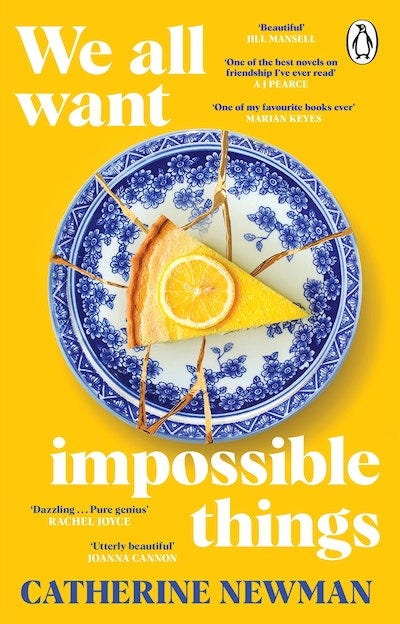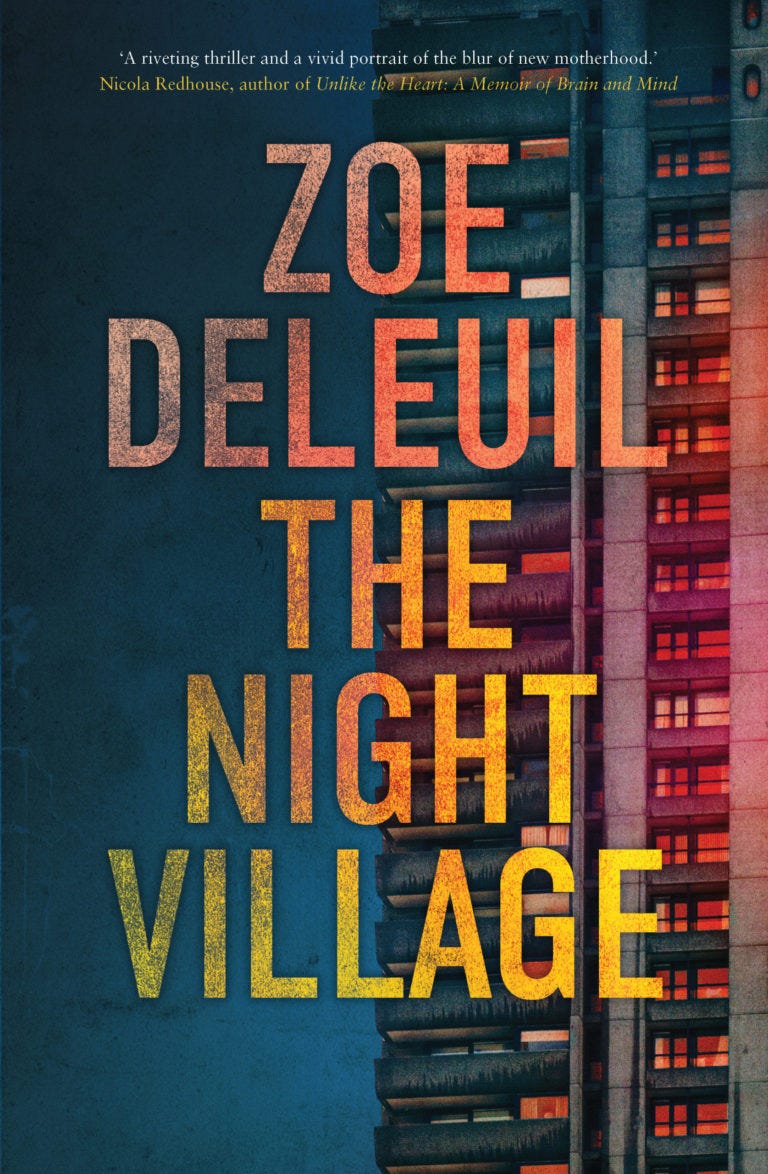Badly behaved characters and writing about impossible things
Catherine Newman’s funny book about death
Spoiler Alert: if you like to go into a book completely blind, and plan to read We All Want Impossible Things, maybe don’t read this review until afterwards.
We All Want Impossible Things is a comic novel narrated by a woman called Ash. Her best friend, Edi, who has a young child, is dying of cancer in a hospice. And, as the reader quickly finds out, Ash is sleeping with pretty much everyone, which seems somewhat inappropriate given the gravity of the situation. So early on, as a reader, you’re thinking, how is the author going to pull this off? Somehow, she does. Although I can imagine a few sleepless nights wondering how on earth it was going to land with readers.
When thinking about how delicately balanced this novel is, I was reminded of the circle of grief. AKA support in, complain out. If you’re not in the actual blurry eye of the storm - losing a parent, a partner, or worse - you offer support to those that are. Your own grief and sadness are not something to burden the inner circle with, those feelings only go outwards, to people equally or less close.
But the outer circles of grief are also intense places to be. You’re losing someone you care about, and you’re watching that person’s most loved people go through hell. There’s nothing, not a thing, you can say to make it ‘better.’ All you can do is be there and offer practical support. Ash’s anticipatory grief at the loss of her oldest friend, all their shared memories, is palpable, and as readers we see or perhaps remember how intense grief and dizzying joy are linked.
Is it plausible?
One of the key things I picked up from writing workshops was the importance of being plausible. As in, a reader will accept a lot about your fictional world, but you need to work out where the cracks might show and either patch them up or tacitly acknowledge them so that the reader is satisfied that you’re not just making things up as you go along.
Even though you are just making things up as you go along. It’s complicated.
In the same way you don’t want to know what happens in a restaurant kitchen, you don’t want to see all the chopping and changing a writer does to create a story. Just give me the delicious, artfully composed finished product. No fingerprints, clean plate. (Which reminds me how much I am looking forward to Intermezzo. I know it will be immaculate, because Sally Rooney novels always are.)
In a long-ago writing workshop, plausibility came up a lot with one tutor, who was also a novelist. It didn’t seem quite plausible that the character would suddenly smash that vase out of the blue, he might say. I think you need to forewarn the reader by giving a hint of his temper earlier on.
At times, Impossible Things does teeter on the brink of plausibility. Edi’s child is mostly removed from the picture, which feels ethically right, given the novel is partly based on a true story, but not how I imagine it would happen in real life. And the story takes place over weeks rather than days, which is not how hospices work, in my thankfully limited understanding. And then there’s Ash, who is making some pretty extreme choices.
Afterwards, I wondered just how Catherine Newman pulled it off. I think it’s partly that Ash acknowledges her own outlandish behaviour. At one point, Edi’s husband says to her, ‘this isn’t all about you,’ and Ash knows that’s a fair point. In another scene, she’s pulled over for speeding and tells the police officer, ‘I know I’m just coming across an a really entitled white woman.’
‘Today, that’s what you are,’ he replies. [I’m paraphrasing; I don’t have the book with me.]
Ash knows she’s acting out. And the reader knows that she knows. That’s part of the book’s charm. Somehow this simple fact – that she is inexplicably out of control but trying very hard to be a good friend and mother regardless – keeps the reader on side. Newman writes so well about family and friendship and this particular story – watching a friend die before her time – feels underexplored in fiction yet is familiar to many of us.
Women going off the rails in mid-life
Without meaning to, this is the fourth contemporary novel I’ve read lately that features a married mother or stepmother stepping out of character in a big way. (Lioness by Emily Perkins, All Fours by Miranda July and A Swift Dark Tide by Katia Ariel were the others.)
It’s been illuminating to live through all this vicariously, although it does get very complicated (case in point, the $20,000 hotel room renovation in All Fours). At this point, though, I am feeling quietly sated when it comes to contemporary midlife-woman-goes-rogue novels so am returning to novel-fuel-reading with some creepy crime and gothic reading.
First up is The Wasp Factory by Iain Banks. It’s the 25th anniversary of its publication and I have an inkling that a teenage psychopath on a remote Scottish island might be just the character inspiration I need for my current work-in-progress. Then I’m reading The Darkest Web - Drugs, Death and Destroyed Lives by journalist Eileen Ormsby about her forays into the underbelly of the internet, and after that I’m hoping my hold for Sociopath, a memoir written by a sociopath (yes, very literal title) will turn up from the library. Readers live a thousand lives!
Thanks for reading. It’s school holidays here but I have a new post coming up about finding kids’ books for a reluctant reader that I will post soon - always good to have some book ideas close to Christmas…
I’m Zoe Deleuil. I'm a freelance writer, author and copywriter. My psychological suspense novel, The Night Village, about a new mother and her unsettling house guest, is out now (and if you look closely at the cover you might recognise the building.)




